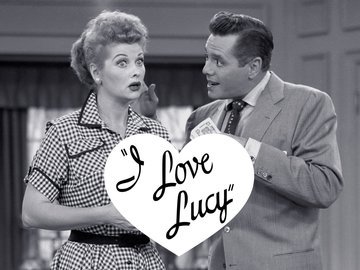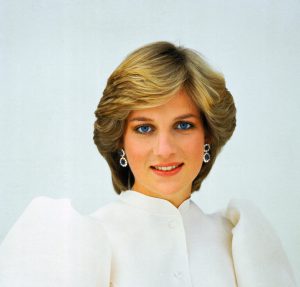Winner of the Fall 2016 StMU History Media Awards for
Best Explanatory Article
Most Captivating/Engaging Article
Best Use of Multiple Images
Best Introductory Paragraph
Best Overall Research
“Lucy, you got some splainin’ to do!” These words were heard by families across America repeatedly in the 1950s. Uttered in a thick Latin accent by none other than Ricky Ricardo, the bongo playing, bandleader, Cuban husband of the flighty, redheaded, Lucy Ricardo on the 1950s television situation comedy, I Love Lucy. This popular television comedy entered the homes of people across America in the years 1951 to 1957. In the six-year span that the show was on the air, it never ranked lower than third nationally among television programs.1 So the question arises: what was it about this show that was so popular among the families in America? The answer to that is simple. I Love Lucy told the tale of a common housewife who dreamed of more than cooking and cleaning; she wanted to be a star. Housewives throughout America related to the character of Lucy Ricardo who longed for more in life, in the period of American history that has been called The Affluent Society.

Lucille Ball was born in Celoron, New York in 1911 to a family who believed that hard work was needed to achieve success. She found work in movies and on the radio, and had a recurring role on the hit CBS radio show, My Favorite Husband.2 Desi Arnaz was born in Santiago de Cuba, Cuba in 1917 to a wealthy family. His father was a politician and landowner and his mother was an heiress. The Revolution of 1932 in Cuba hit the Arnaz family hard, and they were ultimately forced to move to Miami, Florida.3 Arnaz met Ball in 1940. The two immediately connected with one another, and after a five-month whirlwind romance, the couple was married.
However, the marriage was rocky from the start, and it did not help that Ball was forced to stay home due to her acting and radio career, while Arnaz toured with his band. When the director of My Favorite Husband offered Ball the opportunity to take the show to the new medium of television, she jumped at the chance on the one condition that Arnaz be cast for the role of her on-screen husband. Ball was looking for a way to save her marriage, and she believed that working with Arnaz and having him close to home was the way to do it. CBS was hesitant to agree to her request, but they wanted Ball so they decided to film a pilot for the show.4 With her hardworking, no-nonsense family background, Ball was determined to make the show a success. Arnaz and Ball became Lucy and Ricky Ricardo on the immediate hit television show that would run for the next six years.
Family life in the 1950s focused mostly on men working while women stayed home, kept the house, and raised children. Pediatrician Dr. Benjamin Spock published Baby and Child Care, a book that highlighted an approach to raising children that was child-centered as opposed to parent-centered. Dr. Spock viewed the role of the mother as belonging at the center of the household while the husband was the breadwinner and had very little to no interaction in raising children.5 This view began to generate dissatisfaction among women who longed for a more fulfilling life.

I Love Lucy focused on the life of Lucy Ricardo, a ditzy housewife with dreams of fame and fortune, and her Cuban, bandleader husband Ricky. Lucy was far from the typical housewife; she was not satisfied with simply staying home and keeping house while her husband worked or went out with friends. She had quite the imagination and came up with schemes to break into show business, which usually caused tension between her and Ricky. Lucy brought the desires for something more that were locked away in the hearts of housewives across America, and she brought those desires out into the public eye. While she did play her role in an extremely comedic way, she somehow always returned to the dutiful housewife of the 1950s.6

Producers were not sure what the audience would make of Arnaz. He was a television first in many ways; he was the first Hispanic actor welcomed into the homes of the American people on a regular basis. It was the first time many had ever heard a Latino accent, and Arnaz did not fit the typical Hispanic stereotype that most Americans held at that time. Arnaz was handsome, smart, dignified, warm, responsible, employed, loyal, and married. The producers were also concerned about the audience viewing the Ricardo’s marriage as interracial, and this was not something that had ever before been aired openly in movies or on television. Despite these obstacles, Arnaz was treated as an equal white American, and accepted graciously throughout the nation.7

During its six-year reign, I Love Lucy ranked in the top three spots nationally among television programs. Exceptional talent in acting, comedic timing, writing, directing, editing and above all, being relatable, made I Love Lucy an instantaneous success.8 Lucille Ball accepted her role as the zany housewife, Lucy Ricardo, and ran with it. She was not afraid to put herself out there, work hard, and make her dreams come true. Housewives across America finally had a female television star that they were able to relate to; someone who knew there was more to life than cooking and cleaning. With this in mind, maybe, just maybe, they too could stand up and do something more.
- Salem Press Encyclopedia, January 2016, s.v. “I Love Lucy (TV),” by Mary Hurd. ↵
- Salem Press Encyclopedia, January 2016, s.v. “Lucille Ball,” by Richard Adler. ↵
- American National Biography (From Oxford University Press), 2010, s.v. “Desi Arnaz,” by Tinky “Dakota” Weisblat. ↵
- Gigi Anders, “’Luuu-cy!’,” Hispanic 14, no. 11 (November 2001): 44-46. ↵
- Alan Brinkley, American History: Connecting the Past Volume 2, 15 edition (New York: McGraw-Hill Education, 2014), 764. ↵
- Salem Press Encyclopedia, January 2016, s.v. “I Love Lucy (TV),” by Mary Hurd. ↵
- Gigi Anders. “’Luuu-cy!’,” Hispanic 14, no. 11 (November 2001): 43. ↵
- Salem Press Encyclopedia, January 2016, s.v. “I Love Lucy (TV),” by Mary Hurd. ↵



106 comments
Roberto Tijerina
I remember the days when I would stay with my grandma and she would watch the re runs of I Love Lucy at home. This article was great! You really dived into the history of the show while hitting a lot of key parts such as the escape for housewives and the first major Hispanic star on television. You paid a perfect amount of attention to each important part of the show’s making. Great job!
Mehmet Samuk
Great article !!! I have never heard of this show before but your article was very informative. I think I learned a lot about it. It was interesting the role of lucy and her influence on the normal housewives and how they looked up to her. I loved the end sentence of the article !
Jezel Luna
“I Love Lucy”, has always been a show that everyone always referred to, but I knew very little information about. I had no idea that Lucille Ball and Desi Arnaz were originally married, before starring in their show together. It is even more fascinating learning that Desi Arnaz was the first Hispanic actor. I was very amazed that I Love Lucy was such a hit TV show, that it was ranked in the top three spots for six years. Lucille Ball was such an inspiration to many women. Reading this article, makes me want to even watch this show even more now. Great informative article!
Kimberly Rios
I loved this show and your article! As a woman, this article spoke to me. I am grateful to live in a time where doing things other than cooking and cleaning is normal and acceptable. Therefore I feel for women at these times where it was all they could do. I love your article because it truly showed the purpose of the show, to show that women aspire to be more than a typical housewife. Your article was very interesting and kept my attention throughout the entire thing. I was previously a fan of the show, but it was great to learn things I hadn’t known before. Keep up the great work!
Jorge Manzanares
Nicely done! Your article is well written! I truly enjoyed how you incorporated the racial issue of the time. The 1950’s were just prior to the Civil Rights movements in the 1960’s. Therefore, there were high tensions around the topic of race. Even though it was not an African American, race was still an issue. The Chicano movement would not occur for another 20 years, but the problem was still there. You illustrated perfectly how Americans stereotyped Latin Americans! You explained how women were able to relate to the show which ultimately led to the show’s success!
Aurora Torres
I loved watching the show…..Lucy was a very beautiful, talented, smart and funny woman. She inspired so many people especially woman to follow their dreams I’m sure especially in that time era. She made a lot of people laugh during her time in I Love Lucy show. I loved your article. Thanks for the history behind the show.
Vanessa Carrillo
This was a really great read. I used to watch re-runs of this show on Saturday mornings, I remember it always made me laugh. This show had a such an impact that even I didn’t even realize until after this article. She was truly something to aspire to.
Mariana Sandoval
I always thought of I Love Lucy as just a comedic show. I’ve never really seen an episode- I just know of it. But I find it interesting that an interracial couple was accepted on television during the 50s. Not only that, but Lucy was a strong female character despite her still being a housewife- she was still independent in a sense. I find it fascinating that this show was accepted during this time period and I think it should be respected for its comedy and for the barriers it broke in terms of social norms.
Oscar Sepulveda
Great article!! My mom loved this show! She always talked about it and what it meant to women back then. That is a true definition of a woman. She seemed to change the move for women at the time. Great writing.
Analina Devora
I am completely in love with this show. Reading this article reminded me of the “Lucille Ball” museum I visited in Universal Studios and the movie I saw based on the life of Lucille Ball. Though her relationship with her husband was troublesome there is no denying that Lucy made this show a huge success. I loved how you centered this on the way Lucille Ball took a leap of faith and suggested that women could do more than just stay at home. I truly enjoyed reading this article, it made me want to watch an episode of “I Love Lucy”